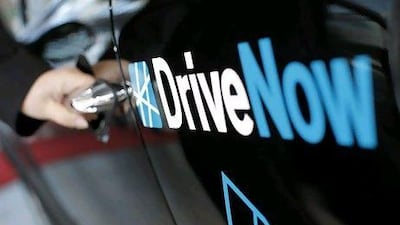Alarm bells are ringing in the boardrooms of Germany's car makers.
Among upwardly mobile young city dwellers, the desire to have one's own vehicle is waning, and hip electronics such as smartphones and tablet computers are replacing the car as status symbols.
Ten years ago, one in two Germans aged between 18 and 29 owned a car. Now it is one in three.
A survey this year conducted among 1,200 people aged 20 to 29 in six German cities showed that 80 per cent believed they did not need a car in town because public transport was a better alternative. Almost 40 per cent agreed that "cars aren't especially cool these days". Once a cherished symbol of freedom and prosperity, the car has turned into an inconvenience and a drain on resources, it seems - at least to young city dwellers who are put off owning one by the high cost of buying and running it, the rapid loss of value, and the constant hunt for parking spaces.
This loss of prestige of the once mighty automobile is common to many developed economies, and it does not bode well for the global car industry. Even Germany's powerful manufacturers cannot live from exports to emerging economies alone.
Daimler, in which Abu Dhabi's Aabar Investments holds a 9.1 per cent stake, was the first of the big manufacturers to respond.
It pioneered a car-sharing pilot scheme for its Smart cars in the southern German city of Ulm in 2008 aimed at earning rental income from affluent urbanites and attracting potential buyers.
Car-sharing works similarly to the cycle rental systems that have sprouted in European cities. The cars can be picked up and dropped off anywhere within the city limits, and are opened with a computer chip attached to one's driving licence. The nearest free vehicle can be located with the help of a smartphone application.
In Hamburg, hiring a Smart costs 29 cents (Dh1.06) a minute including petrol. Daimler has also tested the car-sharing in Austin, Texas, and introduced it in Hamburg this year, where it has made 300 distinctively painted blue-and-white Smart cars available.
Rivals BMW and VW are rushing to follow suit with similar offers called DriveNow and Quicar respectively. BMW's scheme launched this year in Munich and the company plans to expand the offer to Berlin. VW is focusing on Hanover.
Daimler is co-operating with the rental firm Europcar, which handles the registration. BMW said in April there had been 600,000 fully automated rental transactions in Ulm and Austin to date, averaging between 10 and 60 minutes each. Daimler's subsidiary car2go also plans to launch in Vancouver, Amsterdam and other cities.
Daimler strategists say car-sharing could eventually generate more than €100 million (Dh525.2m)) in annual revenue - as much as an entire new model series. But the scheme does not just represent a new source of income - it is also a way to get younger people to test drive vehicles they might later be tempted to buy.
This advertising effect could become especially important as a way to stoke demand for the electrically powered vehicles that are about to come on to the market.
The top German manufacturers are all on the brink of starting series production of battery-powered vehicles and plan to add them to their car-sharing fleets. Daimler plans to introduce an electric Smart next year.
The German car industry is lagging international rivals in the electric car sector, and the new rental schemes may help them to catch up by encouraging the development of a mass market for the new vehicles.
Car-sharing has been around for decades and was first organised on a non-profit basis in various European cities.
However, it took off as an industry in the 1990s and now a number of firms, including Deutsche Bahn, the German railway operator, offer this form of cheap car rental. The disadvantage of the conventional system is that vehicles have to be picked up and deposited at specific locations such as train stations. The new systems offered by Daimler, BMW and VW are far more flexible.
Ecologists complain that the carmakers' schemes are not as green as they sound because they encourage people to take spontaneous journeys that leave a bigger carbon footprint than if they had taken public transport.
Nevertheless, if car-sharing whets young people's appetite for electric cars, the environment stands to benefit - as do the profits of the car makers.

